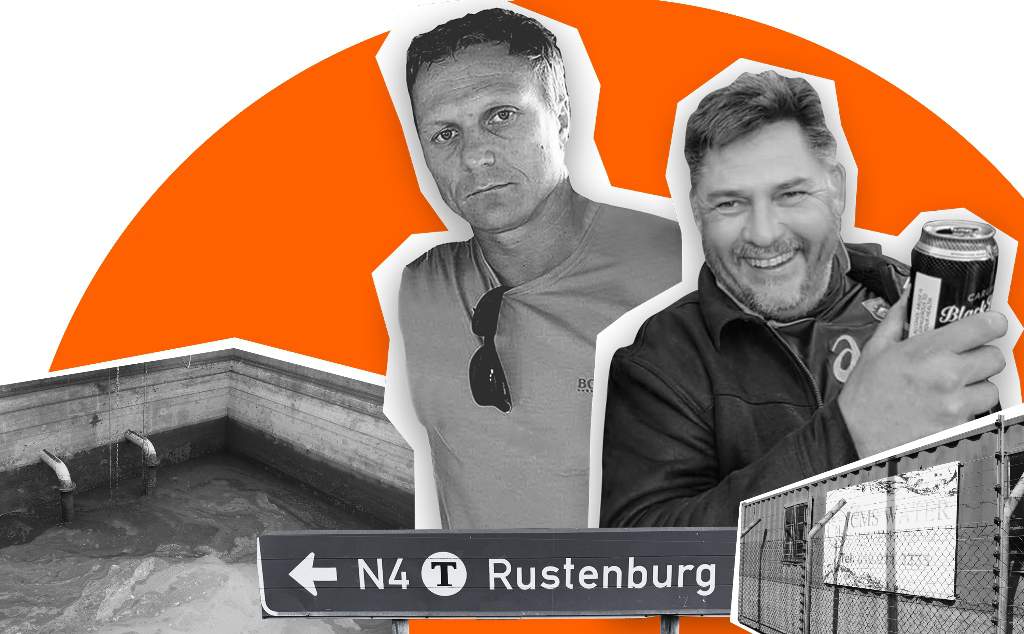
Rudolf Schoeman Jnr (left) and his business partner,Eric du Plessis (right) were supposed to double the capacity of the Bospoort water treatment plant in Rustenburg. But,R26-million and seven years later,there's still a water crisis in Rustenburg.
Magnificent Mndebele/Facebook
When CMS Water landed the R291-million Rooiwal wastewater treatment plant project,the company was already being investigated by the Hawks in connection with the R85-million Bospoort water treatment plant project in Rustenburg.A key consultant raised the alarm at Bospoort,calling CMS Water’s bid “grossly non-compliant”,but he was overruled and CMS Water’s bid was scored 93 points out of 100 on the technical evaluation.Within days of the contract being signed,millions were paid to CMS Water. What the municipality didn’t realise is that CMS Water had a secret agreement to pass most of the money out the back door.Recap: In 2019,CMS Water Engineering won a R291-million contract to refurbish the Rooiwal wastewater treatment plant in Tshwane alongside so-called tenderpreneur Edwin Sodi. The failed project likely played a part in the deadly outbreak of cholera in 2023. But sources in the water industry said this shouldn’t have come as a shock: a 2018 contract to expand the Bospoort water treatment plant had gone sideways in eerily similar circumstances. As we continue Part 2 of our investigation,we explore the system failure that allowed CMS boss Rudolf Schoeman to walk out of one failing government project and into another.
In 2018,CMS Water Engineering was awarded an R85-million tender to upgrade the Bospoort water treatment plant,on the outskirts of Rustenburg.
The project was supposed to double the capacity of the plant that supplies 500 000 residents with drinking water. But seven years later,the project remains incomplete.
When amaBhungane visited the plant last year,the only sign of the project was a blue shipping container sitting outside the plant,with a faded sign on the front,emblazoned with “CMS Water Engineering”.
ADVERTISEMENT
The reason we went back to Rustenburg is that several sources in the water industry told us that what happened with the Rooiwal wastewater treatment plant outside Hammanskraal wasn’t a surprise.
READ | amaBhungane | Deadly water: A trail of destruction across North West (Part 2)
In 2019,the City of Tshwane awarded a R291-million contract to CMS Water and NJR Projects,a civil engineering firm owned by so-called tenderpreneur Edwin Sodi.
The project was to carry out critical repairs to the Rooiwal wastewater treatment plant,but three years later,the City cancelled the half-completed project.
ADVERTISEMENT
Sodi has largely been blamed for the failure of the Rooiwal project,and the City is in the process of blacklisting him and his companies from government contracts.
What we found when we visited Rustenburg was a project that predated Sodi but with all the hallmarks of the Rooiwal debacle.
‘Sabotage tactic’
Rustenburg is an oddity in that water infrastructure projects are not awarded by the municipality,but by the Rustenburg Water Services Trust,which includes the engineering firm,Bigen Africa,as a trustee.
When it came time to award the lucrative Bospoort contract,the municipality had a change of heart: the trust,it decided,was “not well capacitated with personnel and requisite committees [for] the processing and awarding of tenders”.
Instead,the municipality would run the tender itself,although Bigen would remain the consulting engineers who would oversee the work.
But within weeks of CMS being awarded the R85-million contract,the trust told Bigen to stop its oversight work on the project.
The municipality was furious. In a February 2018 “progress report” it claimed Bigen’s decision to stop work was “a sabotage tactic” aimed at destabilising the project “and service delivery in general”.
It didn’t take long for a different story to emerge.
‘Grossly non-compliant’
As was the case with Rooiwal,CMS Water’s bid for the Bospoort contract had risen to the top of the pile after all the other bidders were eliminated for technical reasons.
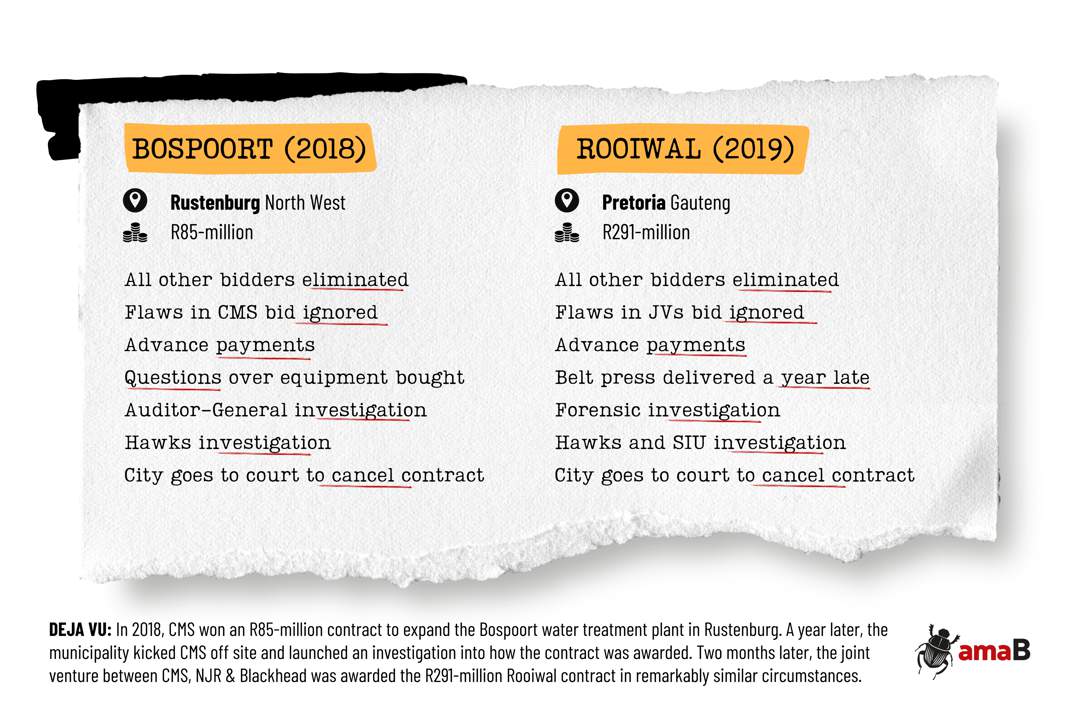
Supplied/amaBhungane
But when the project’s consulting engineer,Ian Pollard from Bigen,looked at CMS Water’s bid,he couldn’t understand why it hadn’t been eliminated as well.
CMS Water’s bid was,in Pollard’s view,“grossly non-compliant”.
There was more than one example,he noted in his report to the bid adjudication committee,of “a material and serious deviation” that was “justifiable grounds to disqualify this tender”.
ADVERTISEMENT
“In [my] view … the offered price is too high for the envisaged works,does not constitute a value-for-money proposition … and may be construed as fruitless and wasteful expenditure,” he warned.
[A]warding the contract to CMS Water Engineering is not supported,and it is recommended that this tender be disqualified based on technical non-compliance.
Undeterred,the three members of the bid adjudication committee scored CMS Water’s bid 93 points out of 100 for technical compliance and recommended that it be awarded the contract.
When a subsequent committee – tasked with awarding the contract – asked about Pollard’s report,the head of supply chain,Sam Makhura,allegedly told them that it had confirmed that the contract could go to CMS.
“[CMS Water] should have been disqualified during the initial evaluation phase,” Rustenburg’s municipal manager Sello Makona wrote in a later court filing.
“The contents and conclusions of Mr Pollard’s report were accordingly misrepresented … in an unscrupulous and completely unjustifiable fashion.”
Makhura remembers it differently. Over tea in Hartbeesfontein he told us: “[Pollard’s] report,it’s a recommendation by an external technical person,the municipality must then apply its discretion … And in this case,that’s exactly what happened.”
Makhura explained that a second technical expert had reviewed CMS Water’s bid and given it the okay. Based on this report – which is not included in the court papers – the committee recommended that CMS Water be awarded the contract.
He added:
I just don’t appreciate the fact that he (Pollard) is making himself to be the Jesus of the process.
At R115 million,CMS’ bid was one of the more expensive. To keep the project within the R85-million budget,the municipality simply reduced the scope of work that CMS Water would be required to deliver.
Within days of the contract being signed,the Rustenburg municipality began making payments.
R26-million richer
In fact,CMS Water had waited just six days after signing the Bospoort contract to issue its first invoice of R17.5 million. A month later,it sent another invoice for R7 million.
ADVERTISEMENT
Rudolf later explained that the municipality was desperate to start the project and spend its budget before the end of the year,so it agreed to give CMS Water advance payments to buy equipment.
National Treasury only allows municipalities to make advance payments in exceptional circumstances because of the obvious risk that suppliers will take the money and not deliver the goods.
But when another technical expert from Bigen reviewed the equipment CMS Water had bought,they discovered problems: “some components were of the wrong specification and not suitable for … the project”,they told the municipality.
READ | amaBhungane | Deadly water: The life and death of a tenderpreneur (Part 1)
CMS Water had also presented “incomplete raw materials” while claiming for finished products,and in some cases,couldn’t prove it had paid suppliers and taken legal ownership of the goods,they wrote.
Out of the R19-million in equipment CMS Water claimed to have bought,only R3.4-million could be verified with absolute certainty,they said.
The municipality,which had initially defended the decision to award the contract to CMS Water,now conceded that the consulting engineers were right to raise red flags.
“The extent,usability,ownership,suitability,and value of the equipment that [CMS Water] claims to have purchased using the funds of the [municipality] is the subject of serious doubt,” Makona,Rustenburg’s municipal manager,would tell the Mahikeng court in 2021 in a bid to have the Bospoort contract set aside.
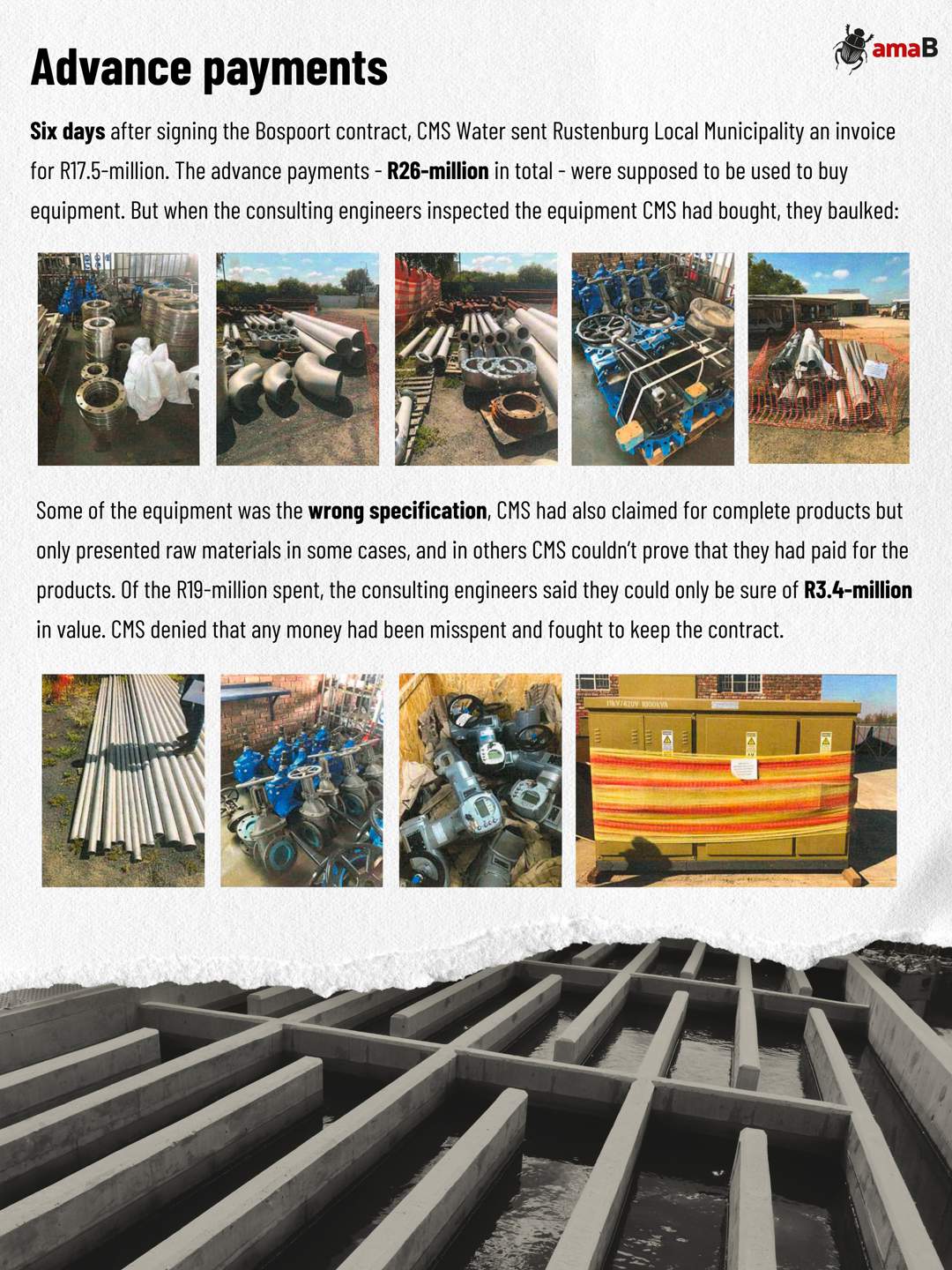
Court records/amaBhunagne/Magnificent Mndebele
CMS Water disputed that any money had been misspent. In an affidavit,Rudolf said CMS Water had provided paperwork to justify the millions it had already spent on equipment,which the technical experts had ignored.
Instead,much like he had done at Rooiwal,Rudolf claimed sinister forces were colluding against CMS: “Bigen Africa was in a preferential position,in effective control of the relevant water works and,in essence,had a monopoly,” Rudolf wrote.
It was clear,he added,that “the preferential position of … Bigen Africa was threatened”,that there were “attempts to thwart the award made to CMS”.
The trust dismissed Rudolf’s conspiracy claims,calling them “hearsay and speculation” in court papers. When we spoke to the trust last year,it said CMS Water’s appointment was,in its view,“unlawful and irregular”,which is why it had refused to work on the project.
The suggestion that this amounted to sabotage was “untruthful,factually incorrect,and malicious”,it added.
Channelling the money
What Rustenburg municipality had no way of knowing was that CMS Water had entered into a secret agreement to hand over most of the responsibility – and most of the money – to another company.
In 2017,Rudolf had set up CMS Global Solutions,ostensibly as a civil engineering arm of his father’s company. The new company,however,was not a division of CMS Water but owned 50% by Rudolf and 50% by a new business partner,Eric du Plessis.
As one former employee put it: “Eric and Rudolf presented as a front to people. It was only inside that we knew the split.”
READ | amaBhungane | Who went to Paris with Paul? Tenderpreneur joined Mashatile’s France-SA business trip
The agreement was that CMS Water would secure civil engineering contracts – using its B-BBEE scorecard and grade 8 PE rating from Construction Industry Development Board (CIBD) – then pass most of the work on to CMS Global Solutions.
According to Jan Brink,a private investigator hired by CMS Global’s liquidators,“it was agreed that the funds of CMS Global would be channelled through CMS Water”.
So when the Rustenburg municipality transferred the advance payment of R26 104 047 to CMS Water for Rudolf to buy equipment,Rudolf had,instead,transferred R25 104 047 to CMS Global,keeping just R1 million in CMS Water.
This was not a civil engineering contract,but a mechanical and electrical one,and Du Plessis,Rudolf’s erstwhile business partner,openly admits that CMS Global had no expertise in this field.
Despite this,records show that he was deeply involved in the project,renegotiating the scope of work with the municipality,and preparing payment certificates to facilitate the R26-milllion advance.
READ | Online gambling explosion: SA’s R1.14-trillion betting industry grows 550% in four years
As for the consultants’ claim that they could only find R3.4 million in value,Du Plessis maintains that the true value of the equipment was likely much higher.
“This estimate provided is very low since two of the items Rudolf instructed us to purchase,namely,filter floors and filter media,amounted [to] more than R3.4 million,” he told us,but added that CMS Global had relied on Rudolf’s expertise and as a mere subcontractor “CMS Global bears zero responsibility for the failure” of the Bospoort project.
System failures
In April 2019,the Auditor-General advised Rustenburg to cancel CMS Water’s contract and open a case with the Hawks.
The audit found several irregularities with the tender,including the scope of the project being reduced with no explanation,and possible fraud in CMS Water’s invoices that saw the municipality seemingly paying for material that hadn’t been purchased.
Only two months later,the City of Tshwane decided to appoint CMS Water to fix the Rooiwal wastewater treatment plant,in remarkably similar circumstances.
As with the Bospoort contract,CMS Water only won the Rooiwal contract after all the other bidders were eliminated on questionable grounds. On both projects,CMS Water would demand and receive massive upfront payments from the municipality. And like Bospoort,CMS Water would use the needs of the community as leverage to hang on to a contract it didn’t deserve in the first place and would ultimately never complete.
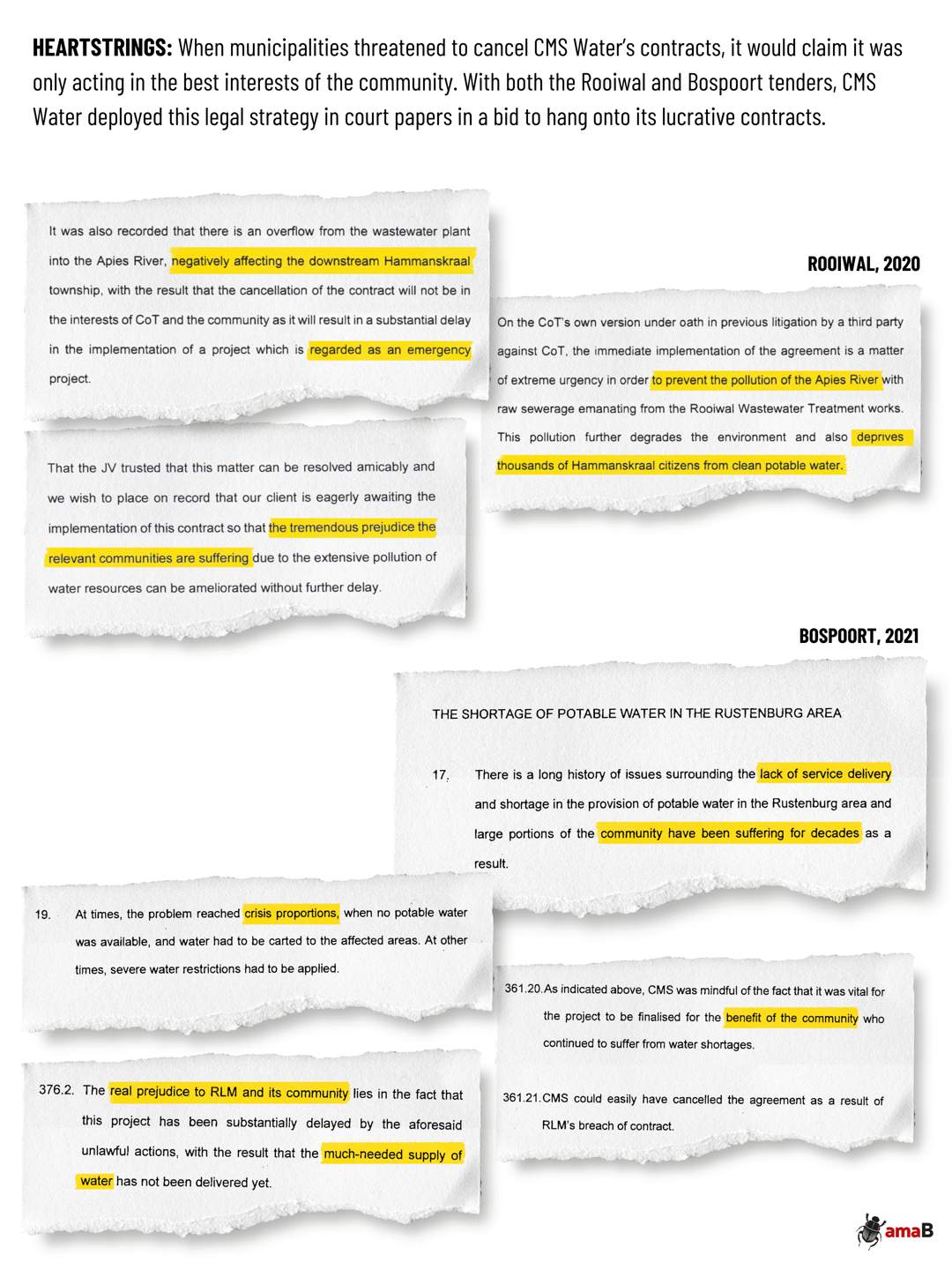
Court records/amaBhunagne
On paper,once the Rustenburg municipality knew there was a problem with the Bospoort contract,it followed the right steps: it stopped all further payments to CMS Water,brought disciplinary charges against the officials who awarded the contract,appointed law firm ENS to conduct a forensic investigation,and reported its suspicions about the contract to the Hawks.
But then,the systems of accountability ground to a halt.
The municipality didn’t want to approach the court to have the contract set aside until the Hawks had completed their investigation: “A premature disclosing of the facts … could only compromise the criminal investigation… However,as time passed,it became evident that the criminal investigation in this matter is not proceeding rapidly as the [municipality] trusted,the municipal manager,later told the North West High Court in Mahikeng.
Concerned that an “open-ended delay” would prejudice its case,the municipality only approached the court in November 2020 to have the Bospoort contract set aside,by which point CMS had already moved on to the Rooiwal contract.
The municipality then also discovered that the procurement files it needed for the case had “patently been interfered with and documents removed”.
CMS Water,which had already threatened to sue the municipality for damages,fought Rustenburg’s decision to cancel the contract.
A second former employee claimed:
There was a stage where the Bospoort people said to Rudolf,‘Listen,we’ll pay you out X amount… Then just leave. Get out of our lives.’ And Rudolf says,‘Fuck you,we want the project because there’s more money to be made than you are willing to pay us out’.
While the case wound its way through unhurried law enforcement and a creaking court system,CMS Water kept securing more tenders.
Meanwhile,Makhura – the official who used his discretion to recommend CMS Water be awarded the contract – had resigned from Rustenburg municipality before his disciplinary hearing,which included charges related to the CMS Water tender.
He didn’t want to discuss the charges when we met him for tea but instead told us he felt pressured into resigning after a senior official called him to an informal meeting after work. “He says to me … Apparently,the Hawks are investigating a lot of things … and if I were you,I’d resign tomorrow morning. I’m advising you as a brother – resign.”
Makhura now works in the procurement department at Magalies Water.
This year,the municipality issued a new tender to complete the work that CMS Water started. But Rustenburg has little choice but to pay up yet again: “The upgrade of the Bospoort water treatment plant … has encountered significant setbacks,primarily due to alleged corruption,” councillor Luan Snyder told the local Platinum Weekly newspaper last year.
“This corruption has halted the project,which is a major factor in the broader water supply issues in Rustenburg … Without the additional … megalitres,Rustenburg will continue to face a water crisis.”
Advance payments and cash withdrawals
Unfazed by the Auditor-General’s report on Bospoort,Rudolf began demanding advance payments on most new contracts,including R71 million on the Rooiwal contract.
“[H]y het advance payments begin vat op meeste van sy goed en dan het hy òf nie die goed gelewer wat hy gesê het hy gaan nie òf net ‘n gedeelte daarvan gelewer en die res van die geld gebruik vir ander goed,” a long-time employee told the liquidators. (“He started taking advance payments on most of his stuff and then he either didn’t deliver the stuff he said he was going to,or only delivered part of it and used the rest of the money for other things.”)
“Ek het met Rudolf gepraat daaroor en toe sê ek vir hom,‘jis,ons raak agter op ons projekte,ons cash flow raak min,ek weet nie waarheen gaan die geld nie,’” another employee added. (“I talked to Rudolf about it and then I told him ‘geez,we are falling behind on our projects,our cash flow is running low,I don’t know where does the money go?’”)
A report,compiled by CMS Global’s liquidators,would later conclude:
On the majority of the projects,advance payments were paid out to CMS Water and the majority of this money was misappropriated by being utilised on other projects and personal expenses.
Meanwhile,increasingly nervous employees were being roped into what they suspected was an ever-growing bribery scheme.
“At one stage,guys went to withdraw R200 000 cash and they were followed from the bank and robbed,” the first former employee told us.
After this,they say Rudolf switched to using a pay-day loans company in Klerksdorp to provide cash.
“[O]bviously betaal CMS al sy Range Rovers,sy huis in Bryanston … en sy groot huis in Potch en in Jeffreys. So hy kry al sy goed en hy kry ‘n salaris,maar ons moet kort-kort vir hom geld vat … tussen R10 000 en ek dink R700 000,” one of the employees told the liquidators. (“Obviously CMS pays for all his Range Rovers,his house in Bryanston … and his big house in Potch and in Jeffreys. So he gets all his things and he gets a salary,but we have to take money to him every now and then … between R10 000 and I think R700 000.”)
As the second employee put it: “He’s my boss,it’s his money. What am I going to [say]? ‘No’? ‘Tell me why you’re taking the money?’ No,it’s his money. I did as I was told,I didn’t know what the money was for,and I still don’t. You’ve obviously got suspicions. But if I went to the cops and said,‘I’ve got suspicions,’ what’s going to happen?”
The collapse
Up until 2019,there were at least 40 projects – collectively worth more than R500 million – that CMS Water completed and handed over without any drama. But eventually,with Rudolf chasing bigger and bigger contracts,CMS Water’s bread-and-butter work began to suffer.
READ | amaBhungane | Bus driver arrest deepens Intercape and taxi violence row
“Rudolf was not a very hands-on boss,” the second employee told us.
While CMS Water’s founder,Rudolf Schoeman Snr,was a permanent presence at the CMS Water office in Orkney,Rudolf,who lived an hour away in the Lekwena Wildlife Estate outside Potchefstroom,was rarely there.
“I think at the beginning,I saw him maybe three times a week. By the end,I hadn’t seen him at the office for more than a year,” the second employee said. “And once he started living in Joburg,if he wanted to see us,we had to go there to his house,where he was murdered – I’m saying murdered,I don’t know,it’s my suspicion.”
We started this series with the suspicious circumstances surrounding Rudolf’s death at his luxury townhouse in Bryanston: Deadly Water Part 1: The life and death of a tenderpreneur.
‘Naby jou skade’
While CMS Water’s eventual collapse apparently came as a shock to its clients — municipalities and water boards across four provinces — former employees told us they had been trying to sound the alarm for years,including with Dolf Schoeman,the company’s founder.
The second former employee told us:
We knew what was going on inside the company … and the number of times we went to Oom Dolf and said,‘Shit’s happening now,you need to take charge,we are going downhill,something’s going wrong’ and it fell on deaf ears.
“And it infuriates me because we saw this was coming,we warned everybody… and until now it baffles me that no journalist has ever come to the people that worked at CMS to discover the full story because there’s so much more behind it.”
But what was going on behind the scenes? And what caused a company with a 40-year track record and R2-billion in government contracts to implode?
As one former employee put it: “[There’s] an old saying in Afrikaans: Ver van jou goed,naby jou skade.”
Essentially it means,if you stray too far from home and don’t take care of business yourself,you’re looking for trouble.
That’s in Part 3 of Deadly Water: The dominoes fall.
Want to hear the story told by the journalists who did the digging? Listen to our DEADLY WATER podcast on Spotify or Soundcloud. Or sign up to our newsletter and get each DEADLY WATER article and podcast delivered to your inbox.
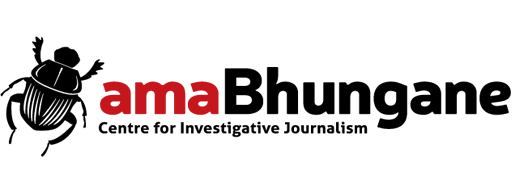
amaBhungane
United News - unews.co.za